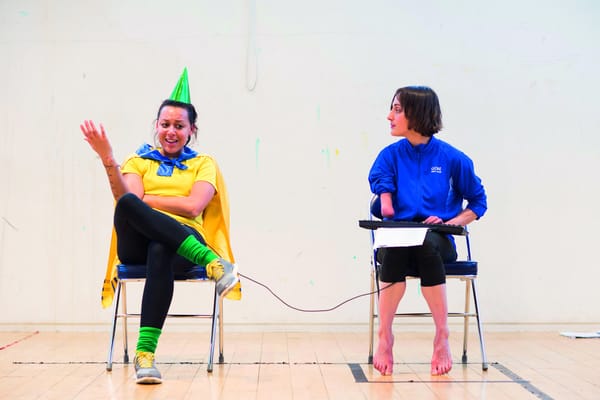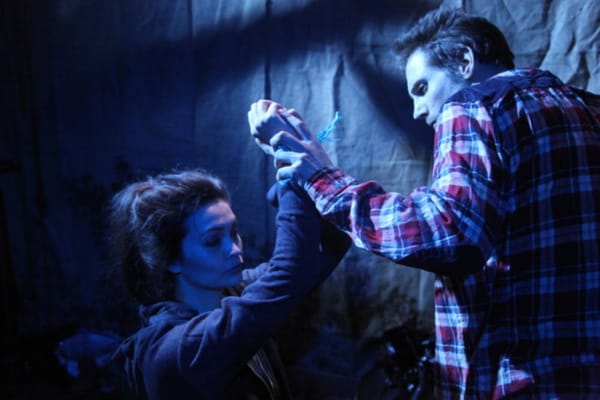Puppetry Without the Punch
Fred Fyles gets a look at Basil Twist's Japanese-inspired production of Dogugaeshi at the Barbican Centre
Puppetry is a dying art. It may not attract the same kind of think-pieces that occur when we fear that e-books may replace the comforting rustle of pages, or when small theatre companies are snuffed out one-by-one due to lack of funds, but the fate facing the puppeteer is no less uncertain. Dogugaeshi at the Barbican Centre makes us aware of both how far the art form has slipped from popular opinion, and displays the work of a puppeteer who has - to the extent that puppeteers can - made it big.
The work of ‘third-generation’ puppeteer Basil Twist, Dogugaeshi takes its name from an ancient Japanese theatre tradition of using a series of sliding screens to alter perspective. Don’t bother googling it; pretty much limited to the small island of Awaji, the tradition is little-known, even within Japan. As part of his research Twist travelled to Awaji, where he did manage to find a group of women who had seen a Dogugaeshi show back in the 1950s, but more often than not simply discovered the remains of this once-vibrant tradition: faded screens, tattered gilt work, and repurposed stages.
The tradition of Dogugaeshi is little known, even within Japan
Twist has spoken of how the practice is closely related to his own work, which often involves innovative uses of puppetry, incorporating flowing material, and non-human figures. Having recently collaborated with Kate Bush on her Before The Dawn stage show (I didn’t manage to get tickets; it’s still a bit of a sore spot), Twist can now be regarded as somewhat famous. Perhaps not famous in the traditional sense, but probably as famous as puppeteers are likely to get - after all, not everyone can be Jim Henson.
Within Dogugaeshi, screens shift back and forth across the stage, flip round to reveal giant dragons, and fall from the ceiling as the mansion central to the plot begins to decay. Rather than an actual play as such, what Twist presents us with is much more of a performance: a series of tableaus, which slowly fade into one another, blurring different scenes together. There is a sort of loose plot, or rather themes which recur throughout the performance; ideas of travel, decay, and revival all come up again and again, as Twist reflects on the very nature of Dogugaeshi as an art form.
While presenting things in this way is obviously a stylistic choice, the lack of structure makes it difficult to understand what is going on, or indeed why we should care. The action is watched over by a mystical nine-tailed fox - the only apparition which could fits the traditional idea of a ‘puppet’ - and Yumiko Tanaka, a master shamisen player, whose work includes both traditional Japanese tradition, and more experimental fare. The atonal, haunting sound of her shamisen swirls around beating drums, while her singing adds a near-drone like element over the top. Ensconced in a beautifully severe kimono, and sitting poised at the edge of the stage, Tanaka’s playing alone is worth the ticket price. Several times during the piece I found myself focussing on her complex finger-work as opposed to the action occurring in the centre.
Ensconced in a beautifully severe kimono, and sitting poised at the edge of the stage, Tanaka’s playing alone is worth the ticket price
And therein lies the heart of Dogugaeshi’s problem: it simply isn’t that engaging. While Twist does develop the genre of puppetry, involving projections, video, and certain experiments with perspective which are admittedly extraordinary, there are only so many times that I can watch screens - exquisite though they might be - being shuffled along a stage. After the show, Twist talked about how some elements of Dogugaeshi evolved as a solution for scene changes, and this is reflected in the nature of the performance. Watching Dogugaeshi is like being constantly on edge, anticipating the moment when the actors will appear, and the action will finally start.
_Dogugaeshi _is running until 31st January, at the Barbican Centre. Dogugaeshi is part of the London International Mine Fesitval; for more information, and performance details, please visit their website









